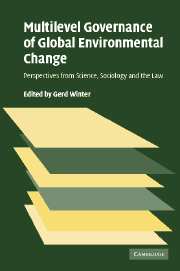 Multilevel Governance of Global Environmental Change
Multilevel Governance of Global Environmental Change Book contents
- Frontmatter
- PREFACE
- Contents
- List of figures
- List of tables
- Notes on contributors
- List of abbreviations
- 1 Introduction
- PART I Earth system analysis
- PART II Society and institutions of global; environmental change
- 4 The social embeddedness of global environmental governance
- 5 Globalising a green civil society: in search of conceptual clarity
- PART III Self-regulation of industry and the law
- PART IV The potential of the state
- PART V The potential of world regions
- PART VI Formation and implementation of international regimes
- PART VII Improving the instruments of global governance
- PART VIII Fundamental concepts of institutionalising common concern
- Index
5 - Globalising a green civil society: in search of conceptual clarity
Published online by Cambridge University Press: 04 May 2010
- Frontmatter
- PREFACE
- Contents
- List of figures
- List of tables
- Notes on contributors
- List of abbreviations
- 1 Introduction
- PART I Earth system analysis
- PART II Society and institutions of global; environmental change
- 4 The social embeddedness of global environmental governance
- 5 Globalising a green civil society: in search of conceptual clarity
- PART III Self-regulation of industry and the law
- PART IV The potential of the state
- PART V The potential of world regions
- PART VI Formation and implementation of international regimes
- PART VII Improving the instruments of global governance
- PART VIII Fundamental concepts of institutionalising common concern
- Index
Summary
Introduction
Over the past decade or so, frequent use of the term ‘global civil society’ can be found in the writings of scholars who study the pluralisation of global politics and international law, especially in the area of environmental protection. While adding prefixes such as ‘emerging’ or ‘nascent’ to the term, many seem to agree that there now appears to be a realm of collective life at the global level, inhabited mainly by non-governmental organisations (NGOs). And indeed, the growing scholarly interest in the concept of global civil society began with the explosion of NGO activity in global politics, including law-making fora. In what has been so far a Westphalian state-centric system, these new non-state actors seem to have increasing influence on the processes and outcomes of international negotiations. They interact with each other, with states, and with international organisations, successfully using different tactics to promote their agendas.
Much of the global civil society literature addresses three key questions. All three have been explored both empirically and normatively, although as will be argued below, many of the normative aspects remain undertheorised. At the descriptive level, these questions are:
Who are the members of what has come to be known as ‘global civil society’?
What do the members of ‘global civil society’ do? How are they involved in world affairs? How do they influence global governance?
Why do they become involved in global politics? And once they do, under what conditions do they become influential?
- Type
- Chapter
- Information
- Multilevel Governance of Global Environmental ChangePerspectives from Science, Sociology and the Law, pp. 106 - 146Publisher: Cambridge University PressPrint publication year: 2006


